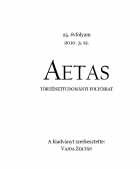Borzsák István hiányzó dossziéja, avagy mit kezdhetett a politikai rendőrség egy ókortudóssal?
The Missing Dossier on István Borzsák, or What Did the Political Police Want from a Scholar of Antiquity?
Author(s): István PappSubject(s): History
Published by: AETAS Könyv- és Lapkiadó Egyesület
Summary/Abstract: The fate of István Borzsák, a prominent figure in Hungarian classical scholarship, well exemplifies 20th-century Hungarian history. But it is not the life of the scholar, who survived captivity and was removed from office, that I present in my paper. Primarily, I was curious to find out what interest did the political police take in his person. Because of his involvement in the revolution, Borzsák was removed from his university post and was entered into the operative records of state security as an enemy of state. From 1963, he taught at the university of Debrecen and could return to his former department in Budapest in 1978. Not even during this period did he conceal his views about the existing system, but it was only among close friends that he was openly talking about politics. First and foremost, he was a scholar. The political police of the era had been collecting data about the professor from 1959 until 1978. The reports were filed in a separate dossier, which did not survive. Yet, from the so called working dossiers of the agents we can reconstruct the original dossier on Borzsák. At the university of Debrecen several agents were spying on him, among them one of his doctoral students, a colleague at the faculty of arts or one of the student leaders of the time. Their reports were assessed by state security officers from the Hajdú-Bihar county police. Analyzing Borzsák's activity proved to be a real challenge for these people as they have little knowledge of classical philology. The surviving reports focused primarily on with Borzsák's relationship with former “56ers”, his influence on his students and his scholarly and friendly relations with Westerners. Though the political police got some information about his so called “hostile political views”, they did not intervene as Borzsák refrained from discussing politics openly. In spite of that, his dossier had been diligently kept. From the 46 reports on him only 17 were deemed valuable by the liaison officer (tartótiszt), that is, only 40% contained useful information. When, in 1978, Borzsák left Debrecen his file was transferred to the so called “objektum” dossier of ELTE. Finally, he was deleted from the operative records of the state security. His surveillance turned out to be unsuccessful after all as neither the agents watching him, nor the liaison officers overseeing them could get close to his person.
Journal: AETAS - Történettudományi folyóirat
- Issue Year: 2010
- Issue No: 3
- Page Range: 96-128
- Page Count: 33
- Language: Hungarian

